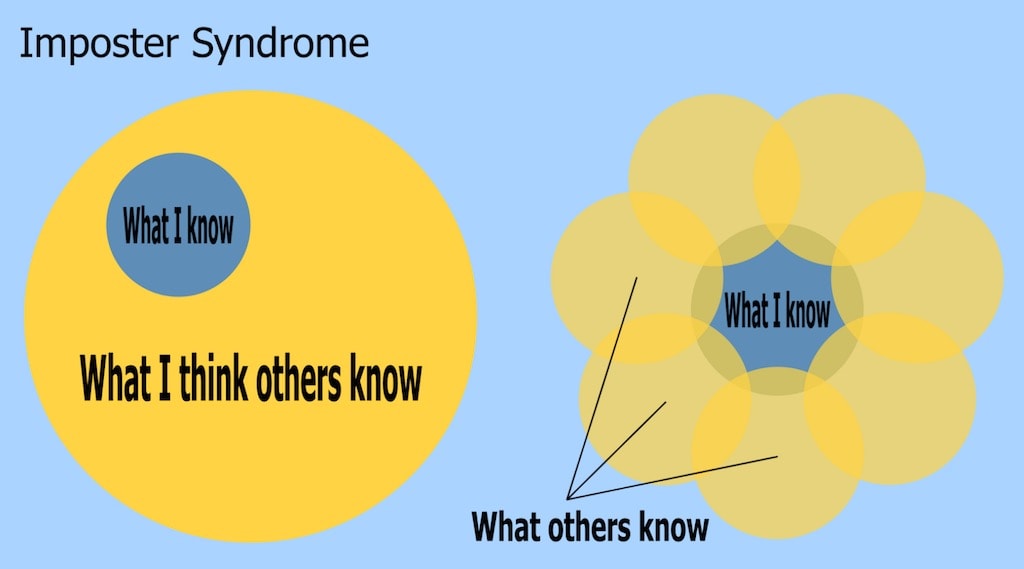The software development industry is vast. There are hundreds of programming languages and tons of front end, back end, and mobile frameworks. And those languages and frameworks are always changing. And the platforms and devices the applications run on are always changing. It is not possible to know them all and stay completely up-to-date on them all. No wonder we are hit with impostor syndrome from time to time.
“It is not enough for code to work.”
Robert C. Martin, Clean Code: A Handbook of Agile Software Craftsmanship
This can cause anxiety among software engineers. It makes us feel like we can never know enough.
What is Impostor Syndrome?
If you would have asked me a few years ago what impostor syndrome is, I would have said ‘I have no idea but you might want to consult a doctor’.
Impostor syndrome can be loosely defined as a psychological pattern in which one doubts one’s accomplishments and has a persistent internalized fear of being exposed as a “fraud”. You end up feeling like everybody around you, such as coworkers or fellow students are smarter and more capable than you. Because of this, you may feel like you don’t belong or deserve to be there.

The feeling is like if you snuck into a theater or a club where you were not on the guest list. Then you are always looking over your shoulder thinking the bouncer is going to find you or that the people around you will see you and think you don’t belong there.
Impostor syndrome is often accompanied by anxiety, self-doubt, and perfectionism.
Where We See Impostor Syndrome
I have had these same feelings for a long time, really for most of my career. I only recently learned it had a name. Most people I know have felt this way at one time or another. It is a very normal feeling.

Impostor syndrome is quite prevalent in the software development industry. If you feel like your coworkers and other software developers always seem to know more and you are having self-doubt, you are not alone. Not by far. Everybody will have different knowledge and different experiences and thus will seem like others know more than you do.
You can be subject to impostor syndrome whether you are new to a job or have been at the same job/company for a long time. Here is a great article talking specifically about having impostor syndrome as at a new job. https://hackernoon.com/new-job-imposter-syndrome-wj4d30yx
5 Steps To Overcome Impostor Syndrome
People who don’t feel like impostors are no more intelligent or capable than the rest of us. The only difference between them and us is that during that same situation that triggers impostor feelings in us, they think different thoughts.
So how do we stop thinking like an impostor?
1. Recognize the impostor voice in your head.
The first step in overcoming impostor syndrome is to learn how to recognize that little voice in your head. The voice that tells you that you don’t know as much as others or that you are not good enough. Once you can recognize this voice, you can take a step back and realize you have a choice. You can succumb to the feeling, or you can do something about it. You can choose to think differently.
2. Understand your strengths and weaknesses.
“There’s always someone who knows something.”
Stephen King
Identify your strengths and weaknesses. When other developers know something you don’t know, it makes it seem like they know more than you. What this means they know something you don’t know…..YET. The key here being “yet.” Also, it is almost certain that you know something they don’t know. Everybody has different knowledge, different experiences, and different strengths.
Take it upon yourself to ask questions about and learn some of the things you don’t know yet. Also, offer your knowledge, experience, and strengths to the team and coworkers. You can each learn from and rely on each other to fill in the gaps.
3. Talk to others.
Talk to friends and coworkers that you trust. You will be surprised how many people feel the same way and can relate. By opening up and talking to your coworkers, you can create an environment of openness and transparency so nobody has to hide their feelings and fear being an impostor, including you.
4. Overcome Perfectionism.
Impostor syndrome can lead to perfectionism and visa versa. When you feel like an impostor, you feel like you need to perform perfectly or else you will be found to be a fraud. Every time you make a mistake you get a surge of anxiety and feel like you are not good enough.
Learn how to set realistic goals and expectations for yourself. Realize that mistakes are normal and are not failures. Making a mistake is just an opportunity to learn and do it better next time. As humans, it is not possible to never make a mistake. This includes your coworkers and colleagues that you feel like an impostor around. They all make mistakes as well. The only difference is how you then deal with the mistakes. Do you learn from it and try again? Or do you stop and feel like a failure. You can choose what you do and how you think about it.
5. Own your Successes.
You made it to where you are with your effort, knowledge, and abilities. Yes, some luck too. That goes for everybody. The success of most people has some bit of luck along with their hard work, knowledge, and experience. The fact is, if you didn’t know what you do and didn’t put in the effort you did, luck would not have helped.
Often people who suffer from impostor syndrome feel like their successes were not earned. They also blame themselves when things go wrong and use it as evidence that they are not good enough. You must learn to see the work you put into your successes. When something goes wrong, use it as an opportunity to learn and try again. You never really fail until you stop trying.
